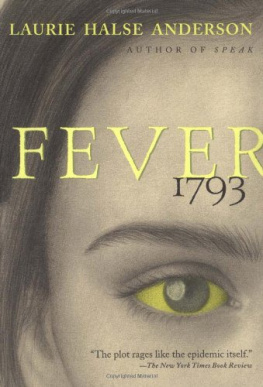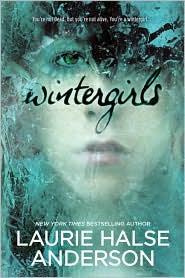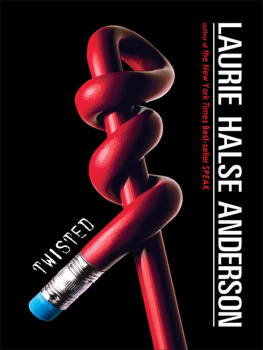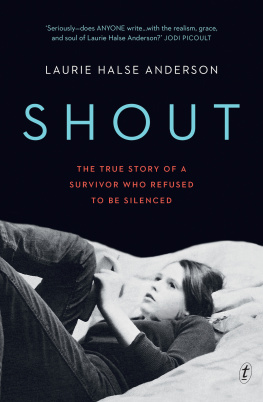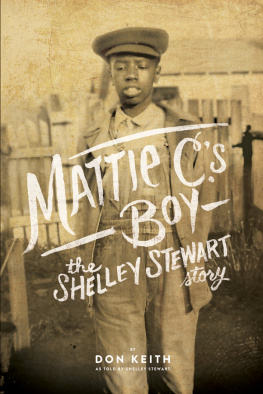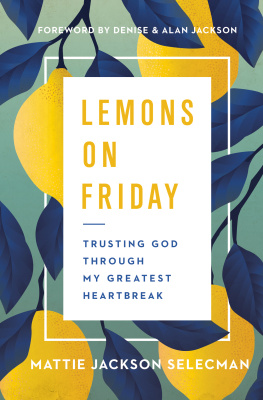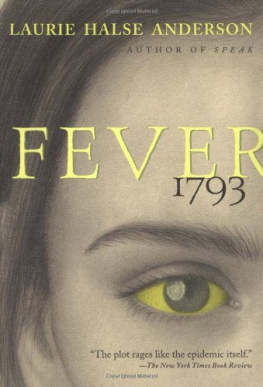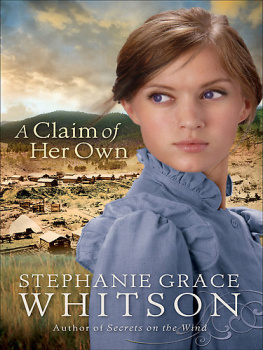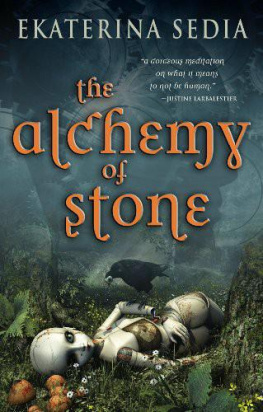Fever 1793
Laurie Halse Anderson
This book is for my father,
Reverend Frank A. Halse Jr, the finest man I know.
-L.H.A
CHAPTER ONE
August i6th, 1793
The city of Philadelphia is perhaps one of the wonders of the world.
-Lord Adam Gordon Journal entry, 1765
I woke to the sound of a mosquito whining in my left ear and my mother screeching in the right.
"Rouse yourself this instant!"
Mother snapped open the shutters and heat poured into our bedchamber. The room above our coffeehouse was not large. Two beds, a washstand, and a wooden trunk with frayed leather straps nearly filled it. It seemed even smaller with Mother storming around.
"Get out of bed, Matilda," she continued. "You're sleeping the day away." She shook my shoulder. "Polly's late and there's work to be done."
The noisy mosquito darted between us. I started to sweat under the thin blanket. It was going to be another hot August day. Another long, hot August day. Another
long, hot, boring, wretched August day.
"I can't tell who is lazier, Polly or you," Mother muttered as she stalked out of the room. "When I was a girl, we were up before the sun ..." Her voice droned on and on as she clattered down the stairs.
I groaned. Mother had been a perfect girl. Her family was wealthy then, but that didn't stop her from stitching entire quilts before breakfast, or spinning miles of wool before tea. It was the War, she liked to remind me. Children did what was asked of them. And she never complained. Oh, no, never. Good children were seen and not heard. How utterly unlike me.
I yawned and stretched, then snuggled back onto my pillow. A few more minutes' rest, that's what I needed. I'd float back to sleep, drifting like Blanchard's giant yellow balloon. I could just see it: the winter's day, the crowds on the rooftops, the balloon tugging at its ropes. I held my breath. Would the ropes break?
The devilish mosquito attacked, sinking its needlenose into my forehead.
"Ow!"
I leapt from my bed, and-thunk!-cracked my head on the sloped ceiling. The ceiling was lower than it used to be. Either that, or I had grown another inch overnight. I sat back down, wide awake now, my noggin sporting two lumps-one from the ceiling, one from the mosquito.
No balloon trips for me.
To work, then. I got to my feet and crossed the room, ducking my head cautiously. The water in the washbasin was cloudy, and the facecloth smelled like old cheese. I decided to clean up later, perhaps next December.
A squeaking mouse dashed by my toes, followed by a flash of orange fur named Silas. The mouse ran to a corner, its claws scratching desperately on the floorboards. Silas pounced. The squeaking stopped.
"Oh, Silas! Did you have to do that?"
Silas didn't answer. He rarely did. Instead he jumped up on Mother's quilt and prepared to pick apart his breakfast.
Mother's best quilt. Mother abhorred mice.
I sprang across the room. "Get down!" I commanded.
Silas hissed at me but obeyed, leaping to the floor and padding out the door.
"Matilda?" Mother's voice called up the stairs.
"Now!"
I made a face at the doorway. I had just saved her precious quilt from disaster, but would she appreciate it? Of course not.
No more dawdling. I had to get dressed.
I fastened my stays and a badly embroidered pocket over the white shift I slept in. Then I stepped into my blue linen skirt. It nearly showed my ankles. Along with the ceiling getting lower, my clothes were shrinking, too.
Once dressed, I faced the rather dead mouse and wrinkled my nose. Picking it up by the tail, I carried the corpse to the front window and leaned out.
My city, Philadelphia, was wide awake. My heart beat faster and my head cleared. Below the window, High Street teemed with horsemen, carriages, and carts. I could hear Mrs. Henning gossiping on her front stoop and dogs barking at a pig running loose in the street.
The sound of the blacksmith's hammer on his anvil reminded me of Polly, our tardy serving girl. That's where she was, no doubt; in the blacksmith's shop, eyeing Matthew, the blacksmith's son. I didn't like it there. The roaring furnace, sparks crackling in the air, the sizzle of hot metal into cold water-it all reminded me of that unmentionable place the preachers liked to go on about.
My favorite place was the waterfront. I squinted eastward. The rooftop of the State House, where the Congress met, was visible, but the August haze and dust from the street made it impossible to see farther than that. On a clear day, I could see the masts of the ships tied up at the wharves on the Delaware River. I promised myself a secret visit to the docks later, as soon as Polly arrived to distract Mother.
A few blocks south lay the Walnut Street Prison, where Blanchard had flown that remarkable balloon. From the prison's courtyard it rose, a yellow silk bubble escaping the earth. I vowed to do that one day, slip free
of the ropes that held me. Nathaniel Benson had heard me say it, but he did not laugh. He understood. Perhaps I would see him at the docks, sketching a ship or sea gulls. It had been a long time since we talked.
But before I went anywhere, there was a dead mouse to dispose of. I couldn't throw it into High Street; it might spook one of the horses. I crossed the room and opened the back window overlooking the garden. Maybe Silas would smell his treat out there and get a decent breakfast after all. I flung the corpse as far as I could, then hurried downstairs before Mother boiled
over.
CHAPTER TWO
August i6th, 1793
... thefirst and most principal to be, a perfect skill and knowledge in cookery... because it is a duty well belonging to women.
-Gervase Markham The English House Wife, 1668
A soon as I stepped into the kitchen, Mother started her lecture.
"Too much sleep is bad for your health, Matilda." She slipped a freshly made ball of butter into a stone crock. "It must be a grippe, a sleeping sickness."
I tried not to listen to her. I had not cleared the wax from my ears all summer, hoping it would soften her voice. It had not worked.
"You should be dosed with fish oil. When I was a girl ..." She kept talking to herself as she carried a steaming pot of water outside to rinse the butter churn.
I sat down at the table. Our kitchen was larger than most, with an enormous hearth crowded with pots and kettles, and two bake ovens built into the brickwork beside it. The size of the room did not match the size of our family. We were only three: Mother, Grandfather, and me, plus Eliza who worked for us. But the roomy kitchen could feed one hundred people in a day. My family owned the Cook Coffeehouse. The soon-to-be famous Cook Coffeehouse, Grandfather liked to say.
My father had built our home and business after the War for Independence ended in 1783. I was four years old. The coffeehouse sat just off the corner of Seventh and High Streets. At first we were lucky if a lost farmer strayed in, but business improved when President Washington's house was built two blocks away.
Father was a carpenter by trade, and he built us a sturdy home. The room where we served customers filled most of the first floor and had four large windows. The kitchen was tucked into the back, filled with useful shelves and built-in cupboards to store things. We could have used a sitting room, truth be told. Father would have added one on if he had lived. But he fell off a ladder and died of a broken neck two months after the coffeehouse opened. That's when Grandfather joined us.
A coffeehouse was a respectable business for a widow and her father-in-law to run. Mother refused to serve spirits, but she allowed card games and a small bit of gambling as long as she didn't have to see it. By midday the front room was usually crowded with gentlemen, merchants, and politicians enjoying a cup of coffee, a

